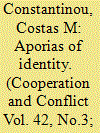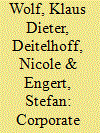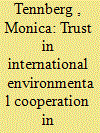|
|
|
Sort Order |
|
|
|
Items / Page
|
|
|
|
|
|
|
| Srl | Item |
| 1 |
ID:
078779


|
|
|
|
|
| Publication |
2007.
|
| Summary/Abstract |
This article examines the predicaments and paradoxes of identity politics in Cyprus. It looks at the historical alliance of colonial practices and nationalist rationales that brought about a static bicommunal system, establishing the basis for inter-ethnic conflict, or what became known as the `Cyprus problem'. The advent of modern governmentality, dividing and classifying the Cypriot population, helped, in addition, to solidify fluid and ambiguous ethno-religious boundaries, making it more difficult for individuals to use ethno-religious identities flexibly and pragmatically, including their use as a tactic to resist the policies of consecutive regimes of power. The article suggests that the 'Cyprus problem' provides a moral alibi for the pursuit of a range of problematic regulations and practices against individuals caught between the dominant ethnic identities, even though there also exist windows of opportunity and resistance on the ground. The article focuses on the genealogy and presence of hybrid communities and syncretistic lifestyles, which complicate and transgress the binary of Greek/Christian versus Turk/Muslim, and the existence of which became progressively abnormalized or exoticized
|
|
|
|
|
|
|
|
|
|
|
|
|
|
|
|
| 2 |
ID:
078781


|
|
|
|
|
| Publication |
2007.
|
| Summary/Abstract |
The political debate about the role of business in armed conflicts has increasingly raised expectations as to governance contributions by private corporations in the fields of conflict prevention, peace-keeping and post-conflict peace-building. This political agenda seems far ahead of the research agenda, in which the negative image of business in conflicts, seen as fuelling, prolonging and taking commercial advantage of violent conflicts, still prevails. So far the scientific community has been reluctant to extend the scope of research on `corporate social responsibility' to the area of security in general and to intra-state armed conflicts in particular. As a consequence, there is no basis from which systematic knowledge can be generated about the conditions and the extent to which private corporations can fulfil the role expected of them in the political discourse. The research on positive contributions of private corporations to security amounts to unconnected in-depth case studies of specific corporations in specific conflict settings. Given this state of research, we develop a framework for a comparative research agenda to address the question: Under which circumstances and to what extent can private corporations be expected to contribute to public security?
|
|
|
|
|
|
|
|
|
|
|
|
|
|
|
|
| 3 |
ID:
078783


|
|
|
|
|
| Publication |
2007.
|
| Summary/Abstract |
The main aim of this article is to examine the role-perception and operation of European Commission officials towards Northern Ireland and the peace process. A relative gap in the theoretical literature, until recently, on the Commission's endogenous preferences is highlighted. The main conclusion is that the European Commission's preferences towards conflict resolution in Northern Ireland have altered since 1994 and that Commission officials exhibit a greater analytical understanding and proactive approach to Northern Ireland. The cause of this change has not been socialization into `European' supranational norms, but instead has reflected the impact of British and Irish cooperation and agreement.
|
|
|
|
|
|
|
|
|
|
|
|
|
|
|
|
| 4 |
ID:
078780


|
|
|
|
|
| Publication |
2007.
|
| Summary/Abstract |
After 27 years of stalemate and inability to make any progress in dealing with domestic terrorism, in 2002 the Greek police finally arrested members of the `Revolutionary Organization November 17', the most lethal terrorist group ever to operate in Greece. The arrest of the terrorists raised several questions that have not yet been satisfactorily answered. Why did Greece take so long before a decisive strike against domestic, left-wing terrorism was recorded? What were the factors that led to the arrest of the terrorists? In answering these questions it is necessary to analyse not just the operational changes in the Greek counter-terrorist strategy that began to materialize at the turn of the millennium, but also the deep-rooted conceptual changes that led to the inclusion of terrorism in the Greek security agenda for the first time. I utilize and extend the theory of `securitization' as developed by the Copenhagen school, and argue that the state's failure to curtail terrorist activity in Greece resulted from the erroneous belief that terrorism was not a direct threat to Greek security. In turn, the belated securitization of terrorism was the key to the arrest of the terrorists that held Greece hostage for almost three decades
|
|
|
|
|
|
|
|
|
|
|
|
|
|
|
|
| 5 |
ID:
078782


|
|
|
|
|
| Publication |
2007.
|
| Summary/Abstract |
In this article, I discuss trust and its manifestations in international environmental cooperation. A lack of trust in the capacity of states and other actors to tackle environmental issues leads to international environmental insecurity. Awareness of such incapacities is widespread and is increasing in `modern risk societies'. Trust is often understood as the rational and intentional efforts of parties to treat one another as trustworthy counterparts and to ignore discretion, but it is also habitual. Trust is based on the socialization of agents into certain practices. The importance of trust and its different dimensions emerged as the central theme in a study of international environmental cooperation in northwestern Russia. Russian and Nordic participants were interviewed in the winter 2003-2004 and spring 2006 with the aim of gathering their views and experiences on cooperation. The interviewees were mainly representatives of regional and national administrations and non-governmental organizations. In addition, in the autumn of 2004 and again in the autumn of 2006, a questionnaire was sent to project managers working in northwestern Russia. The article highlights the importance of the institutional dimension of trust in terms of trust in abstract expertise and monetary systems as well as trust in the representatives of such systems. Both trust and the lack of trust remain important issues, especially in regard to the Russian capacity to develop domestic environmental policies and to improve the status of Russia in international environmental cooperation
|
|
|
|
|
|
|
|
|
|
|
|
|
|
|
|
|
|
|
|
|